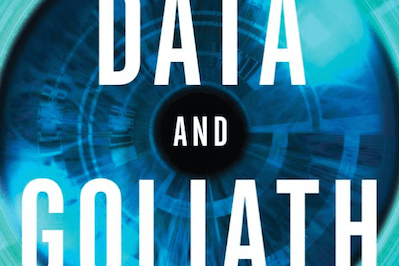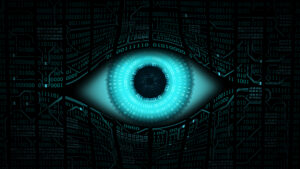Data and Goliath
It was actually the corporate world that built a “massive Internet eavesdropping system,” a new book notes, and the NSA just tapped into it. “It’s less Big Brother, and more hundreds of tattletale little brothers.” W. W. Norton & Company
W. W. Norton & Company
W. W. Norton & Company
|
To see long excerpts from “The Future of Violence” at Google Books, click here. |
“Data and Goliath: The Hidden Battles to Collect Your Data and Control Your World” A book by Bruce Schneier
“The Future of Violence: Robots and Germs, Hackers and Drones: Confronting a New Age of Threat” A book by Benjamin Wittes and Gabriella Blum
“Even the East Germans couldn’t follow everybody all the time,” Bruce Schneier writes. “Now it’s easy.”
This may sound hyperbolic, but Schneier’s lucid and compelling “Data and Goliath” is free of the hysteria that often accompanies discussions about surveillance. Yes, our current location, purchases, reading history, driving speed and Internet use are being tracked and recorded. But Schneier’s book, which focuses mainly on the United States, is not a rant against the usual bad guys such as the U.S. government or Facebook. Schneier describes how our data is tracked by both corporate and government entities, often working together. And in many cases, the American people allow them to do it.
Ordinary citizens may not like giving their personal information to the government, but they will just hand it over to corporations. “If the country’s spies demanded copies of all our conversations and correspondence, people would refuse,” Schneier observes. “Yet we provide copies to our e-mail service providers, our cell phone companies, our social networking platforms, and our Internet service providers.” In other words, the same people who are furious about National Security Agency spying might be perfectly willing to sign commercial terms of service without even reading them.
It was actually the corporate world that built a “massive Internet eavesdropping system,” Schneier notes, and the NSA just tapped into it. This is not to say that he lets the NSA off the hook. He is very critical of the agency for overreach and excessive secrecy. Yet even if pre-Snowden America was not aware of the extent of NSA surveillance, there was still an element of public buy-in. After 9/11, the NSA pretty much had carte blanche to do whatever it took to protect the nation from future terrorist attacks, with some people accepting mass surveillance as necessary for keeping the country safe.
It has become a lot easier for governments and corporations to keep tabs on us. In the past, surveillance was more targeted because it was expensive. Someone would be paid to follow you. Now, thanks to “computers, networks and automation,” intelligence can be gathered in large quantities, about perfectly innocent people, and stored just in case. Today, Schneier says, “it’s not ‘follow that car’; it’s ‘follow every car.’ ”
He argues, however, that storing countless pieces of largely useless data not only violates privacy, it doesn’t make America safer. It may even make us more insecure. Data about us is being stored and held, subject to the whims of future political figures. Schneier asks, “Is someone’s reading of Occupy, Tea Party, animal rights, or gun rights websites going to become evidence of subversion in five to ten years?”
He suggests a range of corporate and government reforms. For example, the United States should publish unclassified details about its intelligence gathering, and corporations should collect less data. Ordinary Americans can also take steps to fight surveillance, perhaps by using encryption or free software for anonymous Web browsing. Schneier avoids using Gmail and says he doesn’t have a personal account on Facebook. Yet he acknowledges that these precautions are not a guarantee of privacy. He may not use Gmail, but people he corresponds with do, which means that Google has roughly a third of his messages. This is not exactly the future that Orwell warned us about. “It’s less Big Brother,” Schneier observes, “and more hundreds of tattletale little brothers.”
The theme of dangerous little brothers is central to Benjamin Wittes and Gabriella Blum’s “The Future of Violence,” a lively and often terrifying exploration of the dark side of our technological age. Technology is increasingly cheap and widely available, a trend that can help empower the masses and weaken central governments. Sounds great, right? We tend to celebrate this phenomenon when individual dissidents use social media to provoke authoritarian regimes. But what happens when these tools of mass empowerment fall into the wrong hands?
The authors detail various hypothetical scenarios, in which drones feature prominently. These days pretty much anyone can get his hands on a drone. You don’t need a pilot’s license, perhaps just an Internet connection and a credit card. Sure, some drone fliers are just harmless tinkerers, as was the man who accidentally crashed a drone onto the White House lawn this year. In that case, no serious damage was done. But what if someone wanted to use a drone to drop disease spores over a densely populated area? Or to send a tiny surveillance drone, disguised as an ordinary spider, into a neighbor’s bathroom to capture images of her naked?
The Internet also helps make the world a more dangerous place. Thanks to the Web, the world is intricately connected. But this interconnectedness can empower individuals to launch cyberattacks on governments. Scientific knowledge also cuts both ways. More people have training and access to labs, which is of course a sign of progress. The downside is that people with basic training and relatively cheap equipment can cause serious damage. An ordinary person probably couldn’t build a nuclear weapon on his own, the authors explain, but he could make a biological one. They describe a hypothetical scenario in which an unhappy grad student tries to re-create the smallpox virus.
The point of all these nightmare scenarios is to demonstrate, as the authors do quite effectively, that we are living in a world in which war is not necessarily a state-to-state affair. Furthermore, “the threats to your personal security now include not merely governments and corporations but also other individuals around the world: stalkers, identity thieves, scammers, spammers, frauds, competitors, and rivals. … You can be attacked from anywhere — and by nearly anyone.”Individuals are also playing a more active role in defense, at least compared with the past. “The individual role in preventing the Soviet Union from launching a nuclear attack against the United States . . . was, in actual fact, vanishingly close to zero,” the authors write. Today, by contrast, individual engineers and scientists play key roles in biosecurity and cybersecurity by working to get rid of infectious diseases or by spotting security problems in commercial software.
To its credit, “The Future of Violence” does not read like a tech book. Wittes and Blum discuss the philosophies of Thomas Hobbes and John Locke. There is a poem by Lord Alfred Tennyson and a reference to the Woody Allen movie “Annie Hall.” The authors offer various suggestions but no easy answers.
“Data and Goliath” and “The Future of Violence” both depict a world that is being oppressed not by an Orwellian Big Brother, but rather by multiple threats coming from various directions. The two books, however, differ slightly in tone. “The Future of Violence” seems more tolerant of a stronger government hand in battling these threats. While Schneier tends to focus on the liberties we sacrifice for the sake of security, “The Future of Violence” emphasizes that security can enhance liberty.
Aggressive surveillance is sometimes necessary, Wittes and Blum suggest, and shackling government just “leaves the many Little Brothers too powerful.”
Emily Parker, a senior fellow at the New America Foundation, is the author of “Now I Know Who My Comrades Are: Voices From the Internet Underground.”
©2015, Washington Post Book World Service/Washington Post Writers Group
Your support matters…Independent journalism is under threat and overshadowed by heavily funded mainstream media.
You can help level the playing field. Become a member.
Your tax-deductible contribution keeps us digging beneath the headlines to give you thought-provoking, investigative reporting and analysis that unearths what's really happening- without compromise.
Give today to support our courageous, independent journalists.


You need to be a supporter to comment.
There are currently no responses to this article.
Be the first to respond.